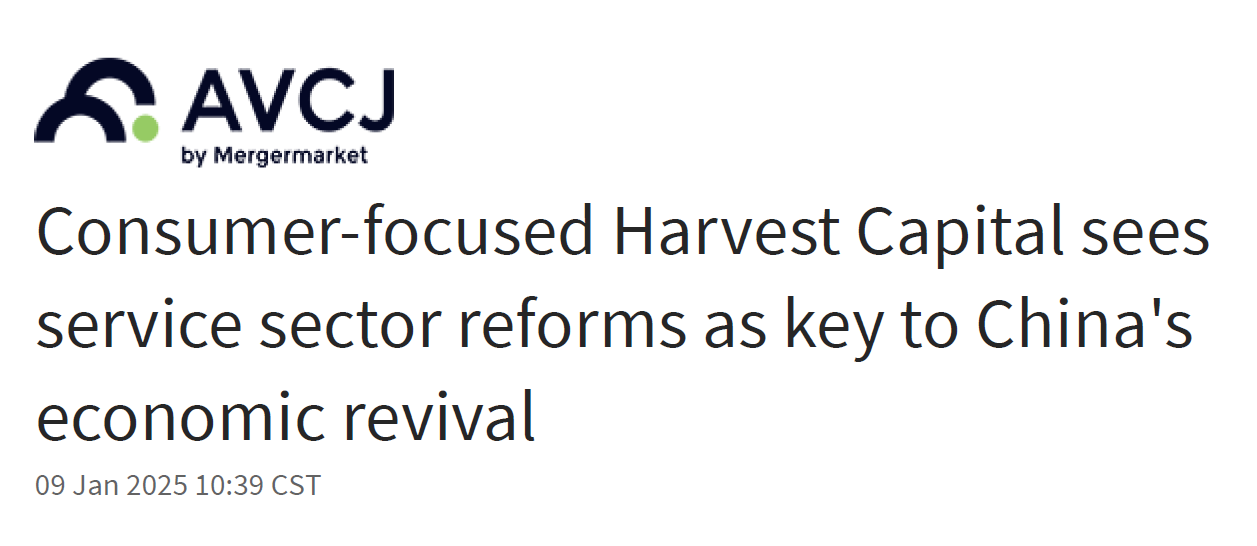AVCJ Interview丨Service sector reforms as key to China's economic revival
Date: 2025-01-09 Views:
Source丨AVCJ
By丨Vivian Li

Recently, China Harvest Capital was interviewed by AVCJ(AVCJ Group Ltd.) Song Xiangqian(Alan Song), Founding Partner and Chairman of China Harvest Capital, believes that reform in the consumer services sector is key to China's economic recovery.
Summary:
Service sector reforms, not short-term stimulus measures, are the key to reviving China’s economy and persuading people to spend again, according to Xiangqian Song, founding partner and chairman of consumer-focused private equity firm Harvest Capital.
“We need to focus on developing the service sector and ensuring that financial markets serve the real economy, improve people's living standards, particularly their disposable income, and promote China's transformation into a consumerled society,” Song said. “Otherwise, it’s challenging for China to escape the middle-income trap.”
His comments follow a short-lived, stimulus-driven rebound that saw China’s retail sales rise 4.8% in October, the fastest pace of growth since March, only to revert to a three-month low of 3% in November, according to the National Bureau of Statistics. The country’s consumer confidence index remains below baseline levels.
Harvest’s continued faith in the consumer story is partly based on stratification, whereby the luxury and mass markets coexist but are clearly divided. “Cost-efficiency will be a crucial theme in the mass market due to inadequate effective demand in the future,” Song explained.
Some of these mass-market bets are already paying off. Last month, Xiaocaiyuan [HKEX:999], an affordable restaurant chain into which Harvest has pumped CNY 500m (USD 68.2m) since 2023 as the sole external investor, listed in Hong Kong. The private equity firm retains a 6.4% stake in Xiaocaiyuan worth HKD 678m (USD 87.1m) as of early January.
Another mass-market food player, fast-casual restaurant chain operator Home Original Chicken (also known as Laoxiangji) is also pursuing a Hong Kong IPO.
Founded in 2007, Harvest has nearly CNY 30bn in assets under management across renminbi and US dollar-denominated funds. It counts the likes of HongShan, Taikang Insurance Group, and GLP as shareholders.
The firm is currently in the market raising its fourth blind pool US dollar fund. LPs in the earlier vintages include fund-of-funds, endowments, insurance companies, family offices, and high net worth individuals. Oriza FoFs, Li Ning [HKEX:2331], and Huatai Securities have all disclosed their participation in certain funds.
Harvest has backed nearly 30 companies to date, typically as a significant – or sole – external investor. Four in five of these businesses have gone public, from apparel brand Aimer and condiments supplier Jiajia Group [SZE:002650] to furniture chain store Easyhome [SZE:000785.SZ].
Eastroc Beverage [SHE:605499] is one of the most successful investments. Harvest paid CNY 350m for a 10% stake in the energy drink brand in 2017 and has made realisations amounting to CNY 4.2bn since a Shanghai IPO in 2021. It retains a 3.91% interest worth over CNY 4.2bn. The overall return is said to be about 24x.
In addition to backing consumer businesses, the private equity firm is active in technology, focusing on applications that improve consumer efficiency. It has previously invested in the likes of Meituan [HKEX:03690] and Didi.
At present, IPO candidates from the consumer sector are heavily scrutinised by mainland regulators. Song played down such concerns, noting that Harvest invests in companies with strong cash flow generation capabilities. On the other hand, the firm also looks to Hong Kong and the US as potential listing venues.
“If China wants to rely on domestic demand to drive its economy and stimulate internal circulation, it should provide consumer companies with equal access to the capital markets. Restricting certain industries is sort of suppression,” Song said.
“Given consumption accounts for 50% of China's GDP and is a significant contributor to growth, denying consumer companies equal access to the capital markets warrants a rethink.”
Founded in 2007, China Harvest Capital adheres to the philosophy of value investing and focuses on China’s consumer and service industries. It is one of the few funds in China with industrial investment capabilities, treating investments as real business operations to create long-term value. The fund has accumulated over 30 billion RMB in assets under management. Supporting China's consumer market and empowering national brands is its core mission.
As a steadfast practitioner of empowerment investment, China Harvest Capital consistently provides enterprises with long-term, comprehensive financial solutions, strategic consulting services, and efficiency enhancement plans.
Representative investments include Jinmailang, Xiaocaiyuan, Eastroc Beverage, Qiaqia Food, Jiajia Food, Laiyifen, Xiaoguan Tea, Aimer, ORG Packaging, Babi Food, Lao Xiang Ji, Wen Heyou, Taikang, Easyhome, Boloni, Carpoly, Yezhifeng, New Pearl, Meitu, Meituan, Didi etc.
Related information


